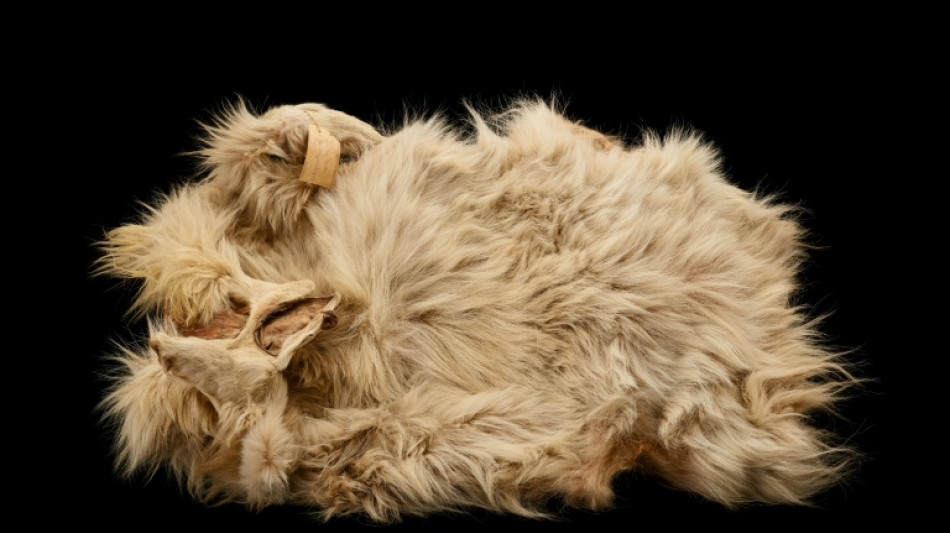
-
 UK growth slows in third quarter, dealing blow to Labour government
UK growth slows in third quarter, dealing blow to Labour government
-
Chris Wood hits quickfire double in NZ World Cup qualifying romp

-
 Markets struggle at end of tough week
Markets struggle at end of tough week
-
China tests building Moon base with lunar soil bricks

-
 Film's 'search for Palestine' takes centre stage at Cairo festival
Film's 'search for Palestine' takes centre stage at Cairo festival
-
Oil execs work COP29 as NGOs slam lobbyist presence

-
 Gore says climate progress 'won't slow much' because of Trump
Gore says climate progress 'won't slow much' because of Trump
-
'Megaquake' warning hits Japan's growth

-
 Stiff business: Berlin startup will freeze your corpse for monthly fee
Stiff business: Berlin startup will freeze your corpse for monthly fee
-
Wars, looming Trump reign set to dominate G20 summit

-
 Xi, Biden attend Asia-Pacific summit, prepare to meet
Xi, Biden attend Asia-Pacific summit, prepare to meet
-
Kyrgios to make competitive return at Brisbane next month after injuries

-
 Dominican Juan Luis Guerra triumphs at 25th annual Latin Grammys
Dominican Juan Luis Guerra triumphs at 25th annual Latin Grammys
-
Landslide win for Sri Lanka president's leftist coalition in snap polls

-
 Australian World Cup penalty hero Vine takes mental health break
Australian World Cup penalty hero Vine takes mental health break
-
As Philippines picks up from Usagi, a fresh storm bears down

-
 Tropical Storm Sara pounds Honduras with heavy rain
Tropical Storm Sara pounds Honduras with heavy rain
-
Pepi gives Pochettino win for USA in Jamaica

-
 'Hell to heaven' as China reignite World Cup hopes with late winner
'Hell to heaven' as China reignite World Cup hopes with late winner
-
Rebel attacks keep Indian-run Kashmir on the boil

-
 New Zealand challenge 'immense but fantastic' for France
New Zealand challenge 'immense but fantastic' for France
-
Under pressure England boss Borthwick in Springboks' spotlight

-
 All Blacks plan to nullify 'freakish' Dupont, says Lienert-Brown
All Blacks plan to nullify 'freakish' Dupont, says Lienert-Brown
-
TikTok makes AI driven ad tool available globally

-
 Japan growth slows as new PM readies stimulus
Japan growth slows as new PM readies stimulus
-
China retail sales pick up speed, beat forecasts in October

-
 Asian markets fluctuate at end of tough week
Asian markets fluctuate at end of tough week
-
Gay, trans people voicing -- and sometimes screaming -- Trump concerns

-
 Argentina fall in Paraguay, Brazil held in Venezuela
Argentina fall in Paraguay, Brazil held in Venezuela
-
N. Korean leader orders 'mass production' of attack drones

-
 Pakistan's policies hazy as it fights smog
Pakistan's policies hazy as it fights smog
-
Nature pays price for war in Israel's north

-
 New Zealand's prolific Williamson back for England Test series
New Zealand's prolific Williamson back for England Test series
-
Mexico City youth grapple with growing housing crisis

-
 After Trump's victory, US election falsehoods shift left
After Trump's victory, US election falsehoods shift left
-
Cracks deepen in Canada's pro-immigration 'consensus'

-
 Xi inaugurates South America's first Chinese-funded port in Peru
Xi inaugurates South America's first Chinese-funded port in Peru
-
Tyson slaps Paul in final face-off before Netflix bout

-
 England wrap-up T20 series win over West Indies
England wrap-up T20 series win over West Indies
-
Stewards intervene to stop Israel, France football fans clash at Paris match

-
 Special counsel hits pause on Trump documents case
Special counsel hits pause on Trump documents case
-
Japan's Princess Mikasa, great aunt to emperor, dies aged 101

-
 Cricket at 2028 Olympics could be held outside Los Angeles
Cricket at 2028 Olympics could be held outside Los Angeles
-
Trump names vaccine skeptic RFK Jr. to head health dept

-
 Ye claims 'Jews' controlling Kardashian clan: lawsuit
Ye claims 'Jews' controlling Kardashian clan: lawsuit
-
Japan into BJK Cup quarter-finals as Slovakia stun USA

-
 Sri Lanka president's party headed for landslide: early results
Sri Lanka president's party headed for landslide: early results
-
Olympics 'above politics' say LA 2028 organisers after Trump win

-
 Panic strikes Port-au-Prince as residents flee gang violence
Panic strikes Port-au-Prince as residents flee gang violence
-
Carsley hails England's strength in depth as understudies sink Greece

| RBGPF | 100% | 61.84 | $ | |
| CMSC | -0.24% | 24.55 | $ | |
| JRI | -0.23% | 13.21 | $ | |
| GSK | -2.09% | 34.39 | $ | |
| BCC | -1.57% | 140.35 | $ | |
| BCE | -1.38% | 26.84 | $ | |
| SCS | -0.75% | 13.27 | $ | |
| RIO | -0.31% | 60.43 | $ | |
| RELX | -0.37% | 45.95 | $ | |
| AZN | -0.38% | 65.04 | $ | |
| CMSD | -0.02% | 24.725 | $ | |
| NGG | 0.4% | 62.37 | $ | |
| RYCEF | -4.71% | 6.79 | $ | |
| BP | 1.65% | 29.05 | $ | |
| VOD | -0.81% | 8.68 | $ | |
| BTI | 0.2% | 35.49 | $ |

Shaggy dog yarn: Study unravels history and demise of long-haired canine
A little-known dog lineage with fur so thick it was spun into blankets was selectively bred for millennia by Native Americans of the Pacific Northwest until its rapid demise following European colonization, a study in Science showed Thursday.
The new research was based on a genetic analysis of "Mutton," one of the last surviving Coast Salish woolly dogs whose pelt was sent to the nascent Smithsonian Institution in 1859, only to be largely forgotten until the early 2000s.
Interviews contributed by Coast Salish tribal co-authors, meanwhile, revealed the dogs occupied a previously underappreciated high-status in Indigenous societies, which revered the animals as members of the family and adorned their most treasured items with their emblem.
The dogs' fleeces were shorn like sheep, with Coast Salish weavers using the wool to craft blankets and baskets that served ceremonial and spiritual purposes.
"I was always curious about why and how the pre-colonial indigenous dogs in the Americas had gone extinct after the arrival of the Europeans," lead author Audrey Lin, a molecular biologist currently at the American Museum of Natural History, told AFP.
Where and when dogs were first domesticated remains murky, but it's clear that some of the first people who settled in the Americas brought their canine companions with them from 15,000 years ago.
Within the span of a few centuries of Western settlers, however, these breeds were all but wiped out -- and modern American dogs contain exceedingly little genetic material of their lost cousins.
- Genetic analysis -
Lin first came across Mutton when she was working as a postdoctoral researcher at the Smithsonian, and was both surprised and excited to learn that virtually no work had been done on the genetics of woolly dogs, which disappeared around the turn of the 20th century.
Based on the genetic analysis, woolly dogs diverged from other lines up to 5,000 years ago, a date that lines up with archeological findings in the region.
"We found signatures of inbreeding depression, showing that... reproduction was very carefully maintained over a very long period of time," said Lin -- echoing Native accounts that dog husbandry occurred in isolated enclosures or on coastal islands.
Mutton's own genetics showed he was 85 percent pre-colonial despite living decades after the introduction of European breeds, reinforcing the idea Indigenous people maintained the lineage's purity until the dogs were wiped out.
By analyzing 11,000 genes in Mutton's genome, the team identified 28 with links to hair growth and follicle regeneration, finding similar markers in woolly mammoths, and in humans with rare congenital abnormalities.
While Mutton's DNA told the story of his lineage, examining chemical signatures of carbon and nitrogen also offered a snapshot of Mutton the individual over his short 1.5 year life.
This revealed Mutton the pup feasted on molasses and cornmeal, but that he later turned to a hunting diet as he traveled the Pacific Northwest under the care of ethnographer George Gibbs, who was part of an expedition to solve border issues between the United States and British Canada.
- Cultural genocide-
But the story would remain incomplete without context provided by Coast Salish Elders, Knowledge Keepers and Master Weavers, whose oral histories were long ignored if not outright dismissed by Western researchers.
The dominant narrative had been Indigenous communities simply lost interest in taking care of their dogs after the advent of manufactured textiles, but co-author Michael Pavel, a Tradition Bearer of the Skokomish Indian nation, said nothing could be further from the truth.
"What we learned about was that our people encountered a very adverse section of history characterized by colonization, genocide, and assimilation -- any and every aspect of our life that associated us with our traditional culture, ceremonies and history were eradicated."
Woolly dogs were raised solely by high-ranking women, a practice that immediately raised the hackles of colonial Christian missionaries.
Moreover the smallpox brought by Europeans wiped out in some cases 90 percent of Coast Salish village populations, leaving the survivors with few resources to care for their beloved animals.
P.Costa--AMWN
